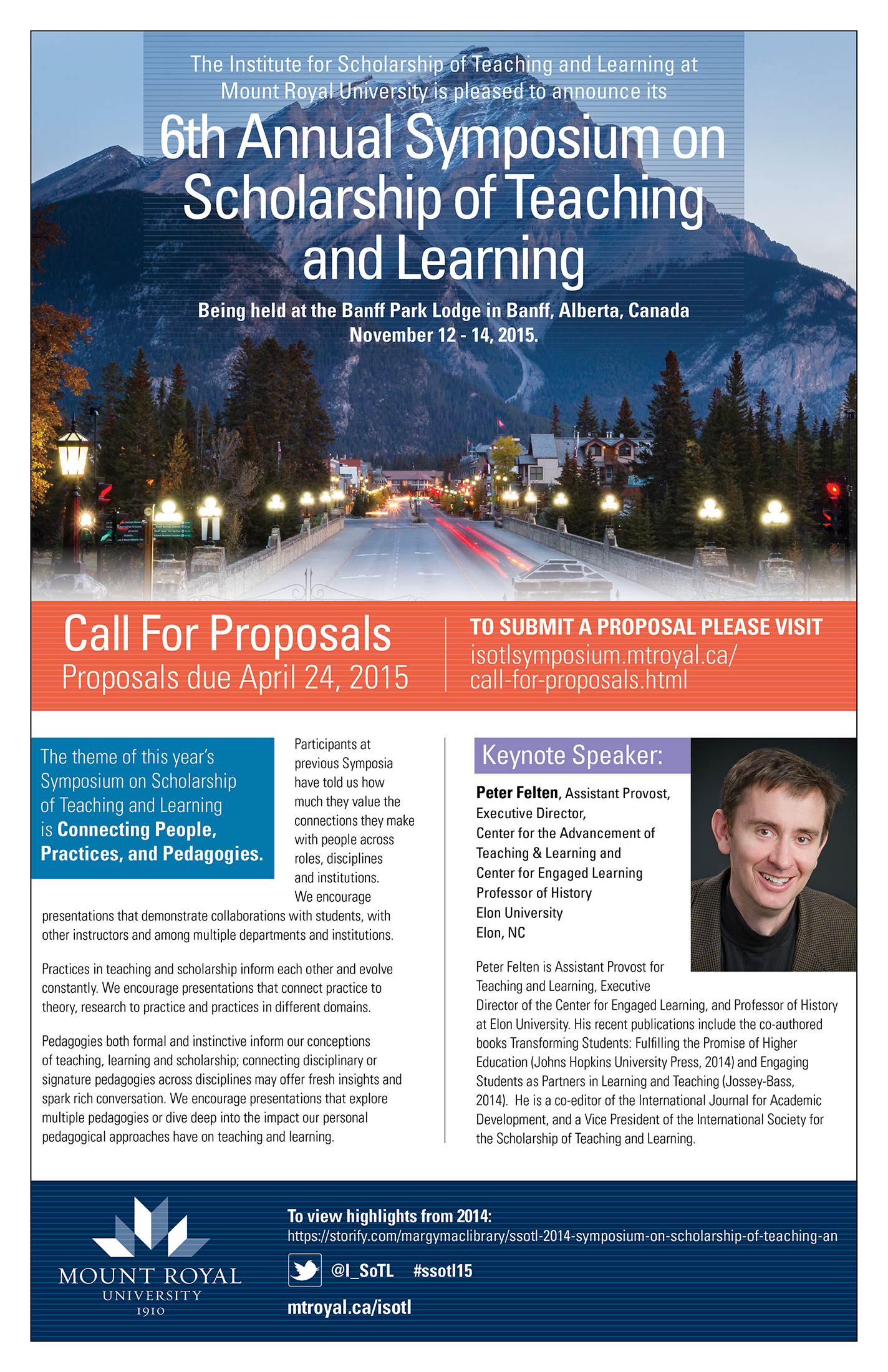MRU scholars presenting at #STLHE2015
A number of us from MRU are presenting at Society for Teaching and Learning in Higher Education conference next week. Looking forward to the generative conversations that will occur!
Wed June 17, 12:00 pm, Seymour Room
Tuning in on Tacit Knowledge
Jennifer Boman, Genevieve Currie, Ron MacDonald, Janice Miller-Young, Michelle Yeo, Stephanie Zettel
Thurs June 18, 11:30 am, Seymour Room
Creating SoTL Concertos for Institutional Impact
Michelle Yeo representing MRU on a panel with colleagues from University of Calgary, University of British Columbia, Simon Fraser University, McMaster University, Western University, Brock University, and University of Waterloo
Fri June 19, 8:30 am, Salon 2
Tuning in to Original Undergraduate Research in Classroom Contexts
Karen Manarin, April McGrath, Miriam Carey
Fri June 19, 8:30 am, Cypress 1 Room
Writing and publishing your Scholarship of Teaching and Learning
Janice Miller-Young on a panel with other CJSoTL editors Shannon Murray, Marilou Bélisle, and Beth Marquis
**also see the SoTL Canada blog for a schedule of other SoTL presentations and the SoTL Canada AGM
What Students Want You to Know About Conducting SoTL Research
A video of this fantastic keynote at last year’s SoTL Symposium is now online – thank you to Ana Sepulveda, Ranee Drader and Margy MacMillan for sharing their experiences and perspectives about how students can contribute to SoTL work, what they learn, and how faculty can help make it as positive an experience as possible!
https://www.youtube.com/watch?v=ILNOIq4ycGg&feature=youtu.be
Abstract:
These two scholarship of teaching and learning undergraduate student co-investigators talk about why they got involved in SoTL research, describe the projects they’ve worked on and what they’ve learned, and share their perspectives on how faculty and students can work together toward improving student learning. Some key themes from their talk include how they now have a better understanding of what research is and what universities do, how much they were inspired and excited by doing the research and gained confidence by being able to add value to a research project, and also how it taught them life skills such as developing time management skills, learning that setbacks are okay, and balancing work/life/school. However, they also discussed some of the challenges of being in a dual role of a research assistant working for their own professors. Their advice for faculty: be patient and remember that undergraduate students are just learning about research; make students feel comfortable bringing up new ideas yet provide constructive criticism; be flexible and realize that your students still have a life outside of school; realize that the relationship you develop will be different than a professor/student relationship; and remember the importance of place – having a dedicated space and community on campus for doing their work is important for them not only to focus but also to feel supported rather than isolated.
See what we’re up to! in I-SoTL’s April report
… including a reminder of the upcoming
Proposal Deadline for the Banff Symposium, April 24!!
isotlsymposium.mtroyal.ca
and
an announcement that Karen Manarin has accepted the new position of Research Associate with the Institute (hooray!) The primary responsibility of this position will be to take a leadership role in an emerging, interdisciplinary research theme such as undergraduate research.
Banff SoTL Symposium proposals due April 24
Reminder: Next SoTL presentation Tuesday March 17 on Scaffolding Undergraduate Research
Effects of a Scaffolded Approach to Undergraduate Research
Presented by:
Karen Manarin, Departments of English and General Education
Miriam Carey, Academic Development Centre
April McGrath, Department of Psychology
If undergraduate research leads to significant learning gains, should it be available to all students as part of the regular curriculum? Karen Manarin, Miriam Carey and April McGrath explore the effects of a scaffolded approach to undergraduate research in a 4th year English class, a 1st year General Education class, and a 2nd year Psychology class in this collaborative scholarship of teaching and learning project.
Tuesday, March 17, 2015
Noon – 1:00 p.m.
Room Y324
No registration required — everyone welcome!
Come and join in the conversation about teaching and learning.
Presentation Reminder – Mobile or Traditional? Student Value Placement on Learning Technologies
Mobile or Traditional? Student Value Placement on Learning Technologies
Thursday February 26, 12:00-1:00pm in Y324
Dr. Brett McCollum, Ph.D.
Associate Professor, Apple Distinguished Educator, Nexen Scholar
Department Chemistry
Student voices are a critical component of an educational experience evaluation when novel technologies are incorporated into the learning process. Combining learner commentary, observed actions, and performance, researchers have identified variations in student experiences when using multiple external representations and the value that students place on learning technologies.
Participants were recruited from first-year General Chemistry, and their responses were categorized and triangulated using a variety of data sources. The results of this project are currently guiding the design and evaluation of digital learning materials for touch-screen interfaces, such as the iPad. Attendees will be given time to reflect on how the findings can be extrapolated to the use of technology in their field.
How to tell the story of SoTL??
I am working on some “stories” about SoTL to support future fundraising initiatives. It is an interesting challenge – until now much of my focus has been on how to facilitate and communicate SoTL within an interdisciplinary community of scholars – what kinds of questions does it ask, what kinds of methodologies does it use, and how can it be rigorous/trustworthy?
Now I am turning my attention to stories and anecdotes and how to “package them” for the layperson (i.e. not a scholar). How can we best describe to the non-scholar what SoTL is and why it is important? I doubt they want to hear about rigour and trustworthiness!! So rather than scholarly ways of classifying SoTL (type of question, methodology, scope), I’m now thinking about the reasons that scholars engage in SoTL. Could this be a better way to tell our story?? Looking at the projects we have supported through the Institute, I think I see 3 different reasons scholars at MRU have had for doing SoTL work:
- Generating and studying innovations in teaching – a teacher (or teachers) has designed a teaching innovation eg. an innovative assignment or a new model to help students conceptualize content or develop skills, and they want to study how well that innovation works in the classroom
- Applying and studying cutting-edge pedagogies in a new context – a teacher (or teachers) wants to try an innovative pedagogy (eg. flipped classroom, reflective writing) that is based on research that already exists, but they want to study it in a new context (usually their own class)
- Understanding the complexities of teaching and learning – a teacher is not necessarily trying something new but is interested in better understanding students’ experiences with difficult topics (racism, social justice), their learning of complex skills such as research or leadership skills, and/or how complicated factors such as diversity and student affect, self-efficacy, or identity influence student learning and experience
For some scholars, these reasons might overlap with each other (especially once the data comes in!!) But do you think this captures most of us? Where would you place yourself?
Call for Proposals: 6th annual Banff Symposium on SoTL, Connecting People, Practices, and Pedagogies
Mount Royal University Annual Symposium on Scholarship of Teaching and Learning
Connecting People, Practices, and Pedagogies
Nov 12-14, 2015
Banff, Alberta, Canada
Proposal Deadline: April 24, 2015
Call for Proposals: http://isotlsymposium.mtroyal.ca/call-for-proposals.html
The Symposium on Scholarship of Teaching and Learning is a practitioners’ conference dedicated to developing teaching and learning research, sharing initial findings, going public with results of completed projects, and building an extended scholarly community. This year’s conference opens with a reception and keynote presentation by Dr. Peter Felten, and will provide a wide variety of plenary and concurrent presentations, and a dedicated poster session. In its 6th year, the conference draws together faculty, students, and administrators interested in the systematic inquiry of teaching and learning.
We invite proposals that match one of the conference tracks (see below) from individuals or teams of scholars for the following formats:
Oral presentations (40 minutes including time for questions)
Workshops (3-hour pre-conference workshops);
Poster presentations
The conference tracks are:
- Research on teaching and learning – presentations on active or completed SoTL projects
- Involving undergraduate students in SoTL – presentations on best practices or example projects where undergraduate students are acting as co-researchers
- Teaching and learning with technology – presentations on the utility and impact of technology for teaching and learning
- Collaborating beyond the single classroom – presentations on multi-class, interdisciplinary, or cross-institutional projects
- Methodologies and innovative approaches to data gathering and analysis – presentations providing a ‘how to’ introduction to specific research methods and theoretical frameworks
- Calls for collaboration, triangulation, and development (poster session only) – poster presentations that share early-stage research questions with the objective of establishing connections with like-minded researchers
Proposals are encouraged from students, faculty, administrators, or community members committed to the systematic scholarly inquiry into aspects of teaching and learning in a higher education setting.
Kudos to David Finch for his paper on managing emotions in a business course with experiential learning
Finch, D., Peacock, M., Lazdowski, D., & Hwang, M. (2015) Managing Emotions: A case study exploring the relationship between experiential learning, emotions, and student performance. The International Journal of Management Education 13(1), 23-36.
Kudos to Melanie Rathburn for her paper on mitigating Math and Science Anxiety in a General Education Course
Rathburn, Melanie K. (2015) “Building Connections Through Contextualized Learning in an Undergraduate Course on Scientific and Mathematical Literacy,” International Journal for the Scholarship of Teaching and Learning: Vol. 9: No. 1, Article 11.
Available at: http://digitalcommons.georgiasouthern.edu/ij-sotl/vol9/iss1/11



